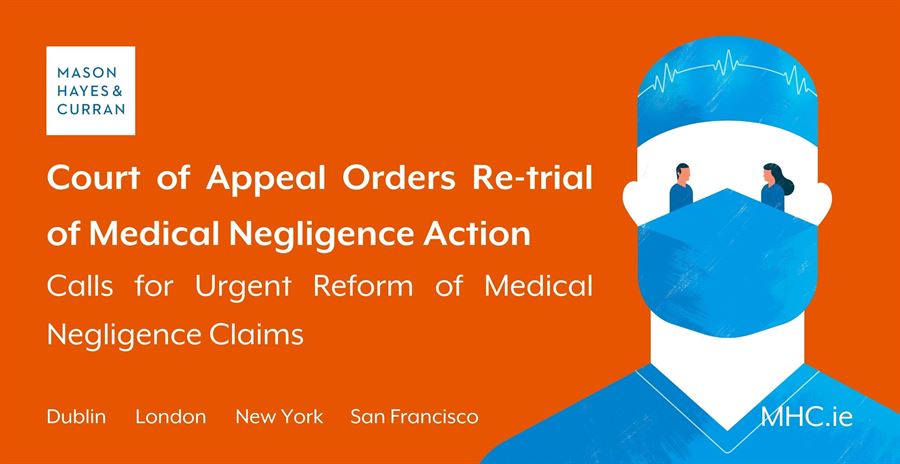Court of Appeal Orders Re-trial of Medical Negligence Action and Calls for Urgent Reform of Medical Negligence Claims

The 2019 High Court case of McCormack v Timlin & Ors saw Mr McCormack, a retired butcher, suing a consultant orthopaedic surgeon. Mr McCormack claimed negligence occured during the treatment provided to him following spinal fusion surgery. We discussed the case in more detail here.
Mr McCormack claimed that he developed Cauda Equina Syndrome (CES) after surgery on 11 March 2010 which was not recognised promptly, leading to a delay in performing surgery until 19 March 2010.
Despite accepting, as a fact, that the developing CES was present on an MRI scan performed on 16 March 2010, Mr Justice Cross concluded that the approach taken by Mr Timlin in both the timing and interpretation of the MRI scan, was not negligent. In doing so, the Court relied upon the principles in Dunne v National Maternity Hospital in determining that Mr Timlin had followed a practice which was general, and which was approved of by his colleagues of similar specialisation and skill.
In July 2021, the Court of Appeal set aside the High Court judgment and ordered a re-trial of the action while also calling for reform of medical negligence claims.
-
Obligation on Judges to explain their findings
The Court of Appeal accepted that it was open to the trial judge to find that the misinterpretation of the relevant MRI scan was not negligent. However, it ultimately held that the trial judge failed to adequately explain why he had proceeded to find against Mr McCormack. Essentially, Mr Timlin was entitled to know “why, though he had apparently won the battle, he had nonetheless lost the war”. The Court of Appeal also found that the trial judge had failed to adequately address whether Mr Timlin had regard to clinical ‘red flags’ that were suggestive of CES. It was noted that all these matters were individually and cumulatively critical to the appropriate resolution of Mr McCormack’s claim. In the circumstances, the Court of Appeal held that the findings of the High Court must be set aside.
-
Case management and call for reform of medical negligence claims
The Court of Appeal commented that these proceedings provide ‘concrete proof’ of the urgent need for reform of clinical negligence claims as recommended by the Expert Group Report to Review the Law of Torts and the Current Systems for the Management of Clinical Negligence Claims. This report was published in December 2020.
The Court of Appeal agreed with Mr Timlin that the case before the High Court was “radically different” to that which was pleaded, which it described as ‘wholly unsatisfactory’. It commented that even if the claim being advanced was clear from the Plaintiff’s expert reports, this did not relieve the Plaintiff of the obligation to plead his case properly. The Court further noted that even in the absence of formal case management procedures, it was open to the parties to engage, and if necessary, seek the assistance of the High Court for the purpose of agreeing a pre-trial case management regime.
Ultimately, the Court of Appeal directed that in advance of re-trial in the High Court, the issues in dispute should be clearly defined to include case management and engagement between expert witnesses with a view to identifying the areas of agreement and disagreement.
Conclusion
With this judgment, the Court of Appeal highlights the necessity of a trial judge to explain their findings and to provide an evidential basis for their conclusions. In circumstances where a judgment fails to do so, it is at risk of being successfully set aside on appeal.
The judgment also constitutes a further call for significant case management reform with a view to narrowing the issues in dispute at trial. Healthcare practitioners may wish to consider relying on this judgment as a basis to apply for case management in appropriate cases going forward.
For more information, contact a member of our Healthcare & Medical Law team.
The content of this article is provided for information purposes only and does not constitute legal or other advice.
Share this:

